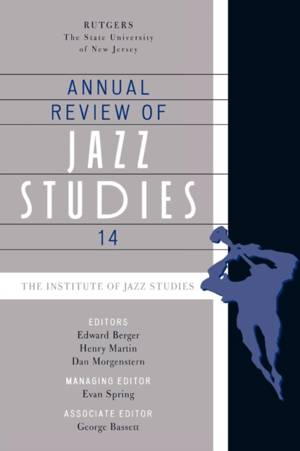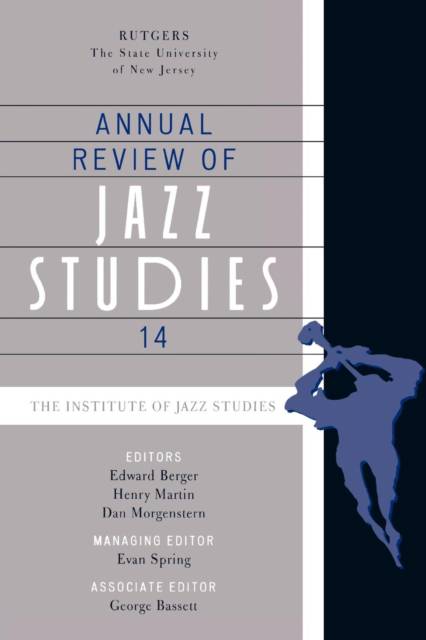
Door een staking bij bpost kan je online bestelling op dit moment iets langer onderweg zijn dan voorzien. Dringend iets nodig? Onze winkels ontvangen jou met open armen!
- Afhalen na 1 uur in een winkel met voorraad
- Gratis thuislevering in België vanaf € 30
- Ruim aanbod met 7 miljoen producten
Door een staking bij bpost kan je online bestelling op dit moment iets langer onderweg zijn dan voorzien. Dringend iets nodig? Onze winkels ontvangen jou met open armen!
- Afhalen na 1 uur in een winkel met voorraad
- Gratis thuislevering in België vanaf € 30
- Ruim aanbod met 7 miljoen producten
Zoeken
Annual Review of Jazz Studies 14
€ 167,95
+ 335 punten
Omschrijving
The Annual Review of Jazz Studies (ARJS) is a journal providing a forum for the ever expanding range and depth of jazz scholarship, from technical analyses to oral history to cultural interpretation. Addressed to specialists and fans alike, all volumes include feature articles, book reviews, and unpublished photographs. This 14th issue contains four intriguing articles that to some degree contravene accepted precepts of jazz orthodoxy. John Howland traces the connection between Duke Ellington's extended works and the 'symphonic jazz' model of the 1920s as exemplified by Paul Whiteman and his chief arranger, Ferde GrofZ. Horace J. Maxile Jr. takes an unfashionably broad perspective of Charles Mingus's 'Ecclusiastics, ' applying recent developments in cultural theory as well as the formal tools of traditional music theory. Brian Priestley's exploration of the ties between Charlie Parker and popular music challenges the canonical depiction of Parker as a lone revolutionary genius, instead underscoring the saxophonist's ties to the popular music of his time. Finally, John Wriggle presents an extensive examination of the life and work of arranger Chappie Willet, an unsung hero of the Swing Era. The book reviews cover a cross-section of the burgeoning jazz literature, and Vincent Pelote has again compiled a list of books received at the Institute of Jazz Studies.
Specificaties
Betrokkenen
- Uitgeverij:
Inhoud
- Aantal bladzijden:
- 232
- Taal:
- Engels
- Reeks:
- Reeksnummer:
- nr. 14
Eigenschappen
- Productcode (EAN):
- 9780810869202
- Verschijningsdatum:
- 3/06/2009
- Uitvoering:
- Paperback
- Formaat:
- Trade paperback (VS)
- Afmetingen:
- 150 mm x 224 mm
- Gewicht:
- 362 g

Alleen bij Standaard Boekhandel
+ 335 punten op je klantenkaart van Standaard Boekhandel
Beoordelingen
We publiceren alleen reviews die voldoen aan de voorwaarden voor reviews. Bekijk onze voorwaarden voor reviews.










